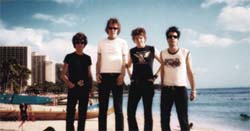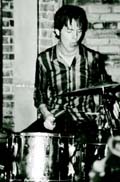" It’s A Shitstorm! – An Interview with Hot Hot Heat  "
"
It’s A Shitstorm With Hot Hot Heat!
" It’s A Shitstorm! – An Interview with Hot Hot Heat  "
"
It’s A Shitstorm With Hot Hot Heat!
Jonathan Dekel tracks down the crazy canucks who will be blowing up your stereo sooner then you think!

I first heard of Hot Hot Heat over a year ago. It’s a nice coincidence that they’re from my native Canada, sure, but it’s hard to deny a force like this could ever be kept under wraps, even in such a large and desolate land.
Combining 60s pop sensibilities with 80s punk sound, and throwing in a little reggae for good measure, Hot Hot Heat are currently sweeping the UK off its collective feet with their first ‘real’ LP Make Up The Breakdown.
I promised the band I wouldn’t ask where they come from and how they formed because, presumably being from Canada, I should know this. But since you aren’t, or you are and you just don’t know, here’s a little rewind:
The first Incarnation of Victoria, British Columbia’s Hot Hot Heat (Paul Hawley (Drums), Dustin Hawthorne (bass), Steve Bays (Keyboards), and Matt Marnik (vocals)) was a much more synth-punk affair. The band started off with a string of small EPs and singles released through a number of smaller independent labels. Shortly after the release of their split LP with Vancover’s Red Light Sting, they decided they had gone as far as they could with Marnik. Bays took over vocal duties and the band brought in a guitarist, Dante DaCaro to flesh out their sound.
After some testing road experiences, the band got snatched up by infamous Seattle label Sub Pop, where they released their Knock Knock Knock EP. The buzz the EP created parlayed itself into the recording of the debut of their first real album, which broke the band into mainstream consciousness in North America.
Coming over the pond with a bang, their lead single ‘Bandages’ got banned from BBC Radio One in Britain because, that’s right, it had the word "bandages" in it. How bandages relay a negative message about war is beyond me, but that’s not the point. The point is the publicity it gave them was huge, and soon they turned into NME cover boys.
This is how they’ve gotten over here, in Rotterdam, the day after Make Up the Breakdown is released in Europe, to play the Nighttown basement. (click to read the review of the show). While I watch the thundering rock show before me, I can’t stop myself from dancing and generally rocking out and eventually find myself in the front, sweaty and fulfilled. I can’t help but feel a bit patriotic that these are the guys who will be representing Canadian rock to the world, instead of, lets say, a certain sk8r girl.
When I meet the band, they’re a little apprehensive at first. Having not heard of the magazine, and having done so much press. I introduce myself as a fellow Canadian and a fan of fellow Canadian romantic rockers The Dears and right off the bat, we’re discussing Canadiana, and, of course, the Dutch music and audience.
I sit down in the backstage area with Drummer Hawley (a gentle giant who’s drumming can be immense as his height, or as gentle as his voice) who seems to be the unexpected press voice for the group. As I find I’ve made quite a blunder and forgotten the mic for my mini-disk recorder, he expertly shows me a way to use the earphones as a recording device and I am forever in his gratitude.
So how have you been enjoying your first European tour?
I’m enjoying it. It’s tough because it’s our first time, and your first time anywhere there’s always gonna be weirdness. Even when you go back a second time, you feel like you’ve sort of settled in and people know your name, but when you’re breaking new ground, it’s bound to be a bit weird. It’s kinda cool to see an audience turn from kinda cold to kinda into it by the end of the set. You can almost see it physically in their faces, and I think that makes it worth it.
Do you find that European audiences are different then North American audiences?
Not to sound cliche but I think music crosses cultures really well. In places like the UK, where we’re a bit more well known, the audiences go a bit crazier considering it was only our second time there. In the States, we had to play up and down the coast a few times before we got the reaction that we wanted. I think press really helps, cuz we don’t have the luxury of touring over here over and over again. We can’t call up Utrecht and say we want a show in a month, and then plan to come to Utrecht for a weekend. It’s gotta be planned with press and marketing and so on, whereas at home we’re much more roots based. I think that’s the main difference: here we’re much more mainstream, and at home we’re much more underground.
How do you feel your recent championing by major press has affected your outlook on the way you approach Europe?
It definitely makes you more confident when you play a show in London after you’ve been on the cover of NME [laughs]. So you come here with the vibe that it’s gonna go pretty well, and what you can do is hope that what you’ve done all along will please the people here, because we’re not gonna pull out any special ticks or anything. It’s gonna be the same things as we always do.
Tell me about the trials and tribulations of going from Sub Pop to Warner?
To be honest, there aren’t any tribulations for us. It’s mostly between them because they’re kinda working the record simultaneously. SubPop’s working on some areas, and Warner’s working on others. For them I think it’s weird because they both have in-house people which work on the same areas and they’re trying to coordinate working on one record together. But for us, we were encouraged by Sub Pop to move up, and I think they knew that we had ambitions to move up. We always moved up, from a local indie-label, to an American indie-label, to Sub Pop, then to Warner. I kinda like where things go every step of the way. More people come to the shows, a bit more money, it makes it easy to sustain itself. You don’t have to work a job, spend all your spare time with the band, live with three other guys in the same apartment. You can start enjoying some luxuries, and I’m not talking about LUXURIES, I’m talking about a new van, some new gear, and we got to quit our jobs. Stuff like that is why we moved up, and so far there hasn’t been a backlash. I mean, we were never champions of the do-it-yourself ethic. A lot of our favorite bands are, and that’s why we love them, but we were never punks till death. We want to be able to make music for years. We want to be able to do this forever, ideally.
Does it annoy you that the record you recorded over a year ago is only coming out in Europe now?
It doesn’t annoy me, just because I know that it has to happen area by area. You can’t release it all over the world [simultaneously] because then you’d have to go promote it all over the world!
 It came out in America, we played in America; It came out in Canada, we played in Canada; Now it’s coming out here, and we’re playing here. I don’t think the record is irrelevant because we recorded it a year ago. I still think it’s still powerful. Hopefully people here will like it like they liked it everywhere else. It’s nice to come and look at the sights, that’s for sure.
It came out in America, we played in America; It came out in Canada, we played in Canada; Now it’s coming out here, and we’re playing here. I don’t think the record is irrelevant because we recorded it a year ago. I still think it’s still powerful. Hopefully people here will like it like they liked it everywhere else. It’s nice to come and look at the sights, that’s for sure.
Going back to the English press, how did you guys react to the BBC banning ‘Bandages’? Personally, I found it a bit ridiculous.
It does seem silly to us; you and I feel the same way. I think most people in our age group feel the same way. However, BBC One is listened to by anyone from mothers with babies to seven-year-olds and in serious times, they have to consider all demographics.
For them to ban it doesn’t shock me, but it does seem silly. Did it affect the popularity of the song? I don’t think so. Did it get us more press? Probably. They only ban things that are widely known. The Beatles were banned, The Stones were banned; we’re in good company.
So what’s next?
We’re on tour for four or five more months then I think we’re gonna put our foot down and start on the next time. I mean doing new songs is what makes us the happiest, aside from our live shows. We thrive on doing new songs. The first time we play new songs, we get such a buzz!
We’re addicted to doing something new and making it perfect. Then almost as fast as we get the buzz, it’s gone and we wanna move on to something new. We get really impatient really quickly, and if we don’t have something new then boredom can creep in. Boredom is the killer. Hopefully people will wait for us.
Not just that, but also you feel uncreative with playing the same songs over and over
Yeah! Yeah! Yeah! Also being on the road, you see new things, you buy new CDs, you’re thinking about music. The wheels are turning but they’re not catching the gears, and unfortunately we don’t write on the road very well because we’re restless and it’s hard in a van or bus, and life is already so hectic when you’re on the road. I need to wake up and have time to just sit with my guitar and write.
So are you guys excited for the European festival circuit?
Yeah, I remember hearing about Soundgarden playing Reading.
Lets not forget Nirvana’s memorable performance!
That’s true. Personally, the festivals are a storm, just a shitstorm! You go from 0-60 all day, you’re going at full speed, and then you kinda crash and it’s all gone in a blur. I’m looking forward to playing for an appreciative audience, always, but to be honest I’m trying to think about tomorrow’s show rather than a show that far away.
So what do you hope for Hot Hot Heat in the future?
Hopefully, it just gets better and better. I mean, most of what I hope for this band is in my dreams, but most of my dreams have already come true.
